5 global macrotrends poised to change your business
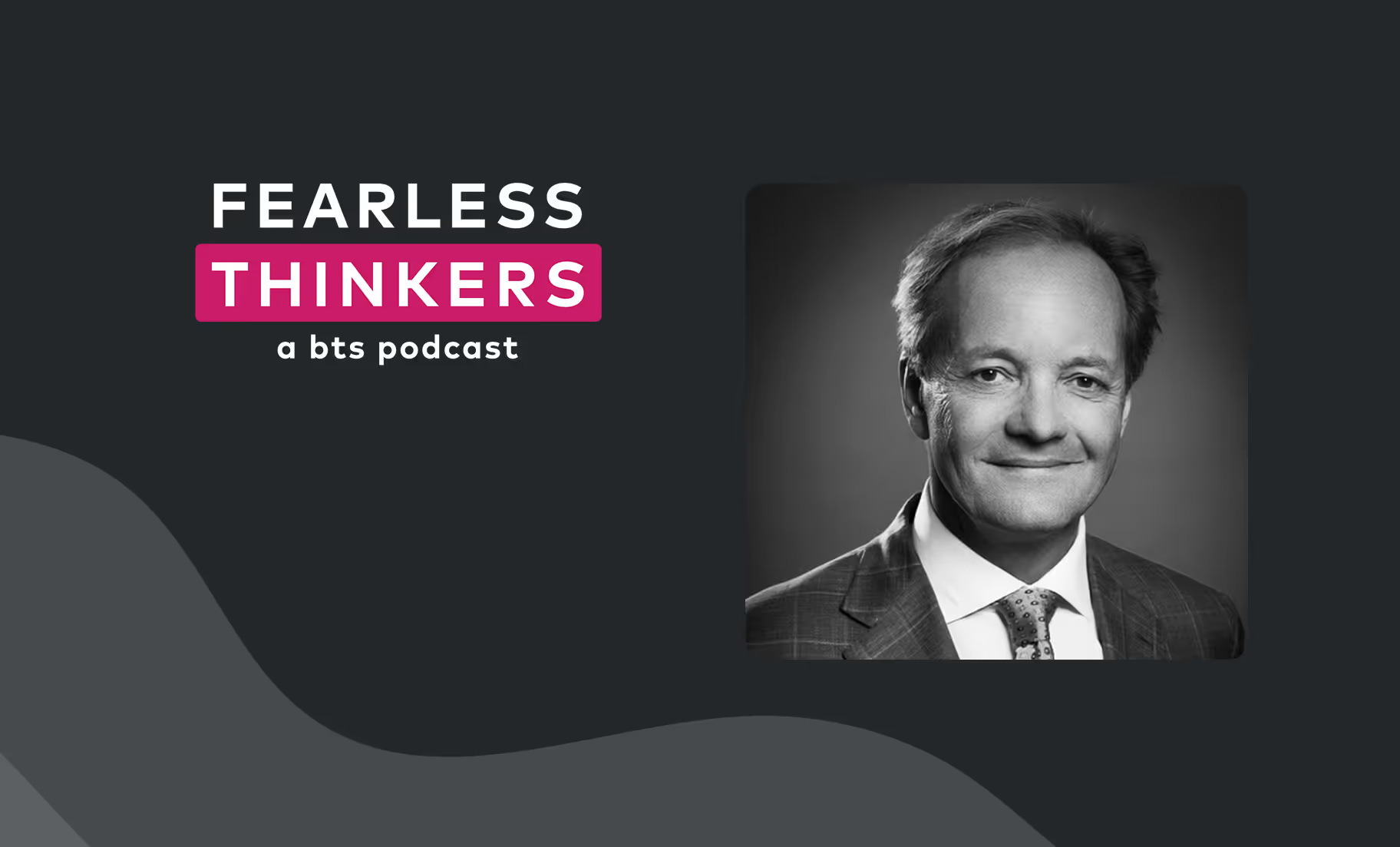
Navigating global markets
In the most recent episode of Fearless Thinkers, we feature Henrik Ekelund, innovative Founder and Chairman of BTS Group. He talks about his new ventures since transitioning from CEO to Chairman. Henrik shares insights of five current global macrotrends that are impacting every corporate’s success and resilience. Henrik also shares from his research on national prosperity – what are the key components that underpin thriving countries.
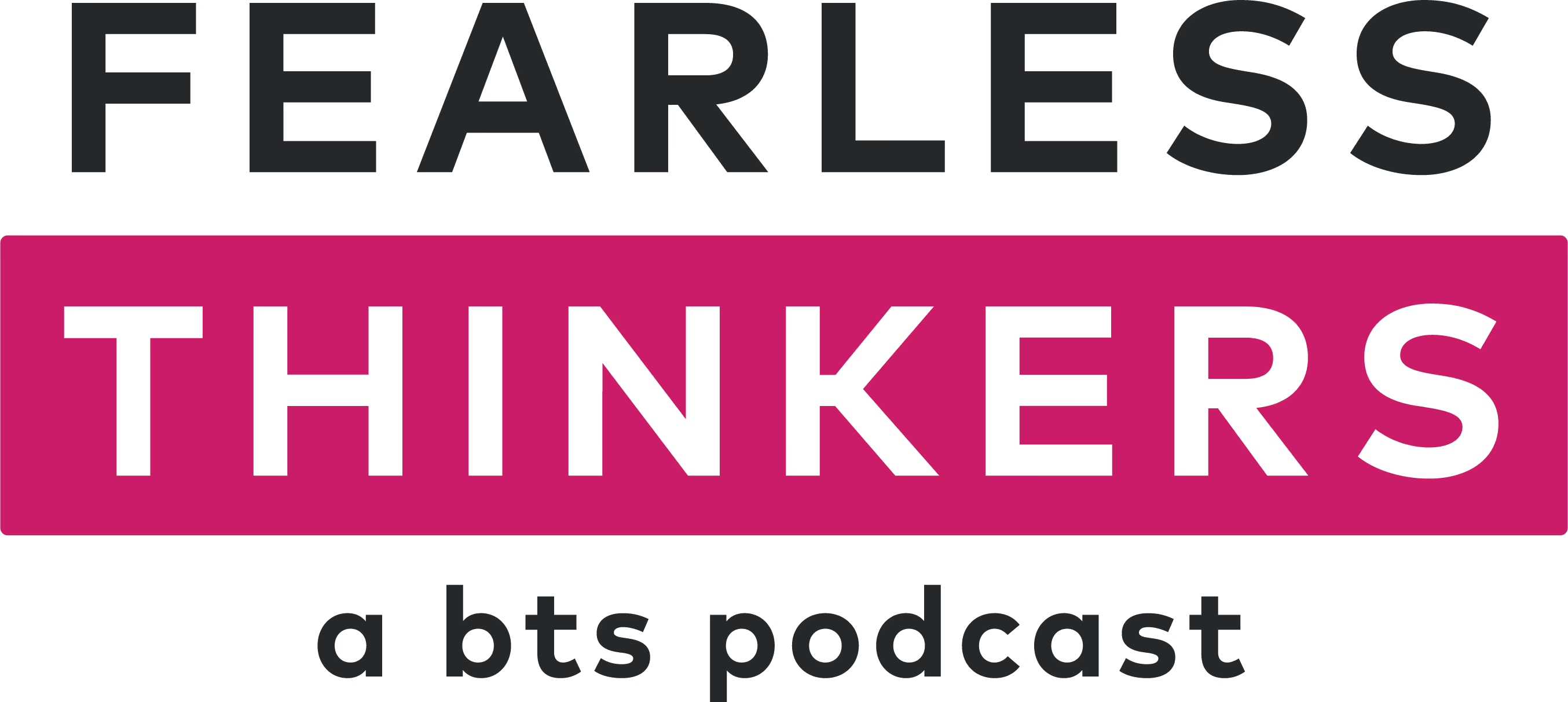
Most of us want to lead in a way that matters; to lift others up and build something people want to be part of.But too often, we’re socialized (explicitly or not) to lead a certain way: play it safe, stick to what’s proven, and avoid the questions that really need asking.
This podcast is about the people and ideas changing that story. We call them fearless thinkers.
Our guests are boundary-pushers, system challengers, and curious minds who look at today’s challenges and ask, “What if there is a better way?”If that’s the energy you’re looking for, you’ve come to the right place.
Masami: Welcome to Fearless Thinkers, the BTS podcast. My name is Masami Cookson and our host is Rick Cheatham, Head of Marketing at BTS. On today’s show, Rick sits down with Henrik Ekelund, Founder and Chairman of BTS Group. As CEO for 36 years, Henrik led BTS from its start in a cold garage in Stockholm. From its IPO in 2001, the company grew 1200 percent and maintained an average of 18 percent annual shareholder returns throughout his tenure.
In addition to his work leading BTS, Henrik is an investor and board member for many startups and high-growth companies and is involved in several charitable causes. Most recently, the Sweden America Foundation and the Stockholm School of Economics. In 2010, Henrik was named Sweden’s Entrepreneur of the Year.
Henrik also writes for major publications such as the World Economic Forum on the subjects of economic policy and economic growth.
Hey, Rick, how’s it going today?
Rick: It’s going great, Misami! It was a big day yesterday. I’ve been waiting and waiting and waiting on a list, to get a Burmese mountain dog and it was finally my turn to pick. So, I will have a new family member by the end of the month.
Masami: Oh my gosh, that’s so exciting. Who doesn’t love a new puppy? Um, any ideas for the name?
Rick: Actually, yes, my oldest daughter helped me pick it out. We’re going to call him Buck. Good old Texas name.
Masami: Oh, I love that.
Rick: So big, lazy dog named Buck. But, yeah, anyway, that got my week off to a great start and actually, this conversation with Henrik, kind of continued that positive energy for me because he’s so interesting in that he’s not only very approachable and down to earth in the way that he speaks, but is able to wrestle with some big, complex business and, global economic issues.
So, he brings a lot to the table in this conversation.
Masami: Wow. I can’t wait to hear more.
Rick: Hey Henrik, welcome to the show.
Henrik: Thanks, Rick. It’s great to be here.
Rick: Well, it’s always a pleasure to sit down and chat with you, but I’m curious, what else have you been up to these days?
Henrik: I’m still very involved as Chairman of BTS, but these days I have more time. On the professional front, I was at a very stimulating and educational meeting at the World Economic Forum, but I also had some time to do one of my passions. I did some adventure sailing. I enjoyed that a lot.
Rick: Wow. That’s phenomenal. As a young student at university, I had the chance to teach sailing off the coast of Cape Cod here in the US one summer and I’ve always wanted to go on a real sailing adventure, but have never made it. So that sounds fantastic.
Henrik: You know, it is, I mean, it’s a lesson in teamwork. It’s exploration and you’re close to nature. I’m truly passionate about that.
Rick: Sounds fantastic obviously you just mentioned being at World Economic Forum. I know you’re a constant student of business. I’m sure our audience would love to hear your perspective on something larger than just business trends today, but more, are the macro trends that are going to be affecting us well into the future?
Henrik: I think that’s a great question and I tend to think about five macro trends and they all start with a D. So let me give you the summary. Number one, declining demographics. Number two, deglobalization. Number three, digitalization. The fourth one is about diversity, equity, inclusion, and the fifth, decarbonization.
So that’s the big overall summary of those macro trends.
Rick: Those are all huge things that I know actually already affecting many businesses today and I would think would be even more significant in the future. So, let’s dig into that first one and the shift in demographics as birth rates continue to go down share a little bit more what you think the impacts are there.
Henrik: Yeah, Rick, you know, this is the most inevitable trend. Just looking at the math, you know, how birth rates have declined from the 1990s, we know that the demographic pyramid will change that will lead to slower economic growth, to shortage of talent, difference in how much we save and consume and what we buy.
It could also put further strain on public finances. And if you look at those deeper, there are some big, big consequences for, you know, basically every business.
Rick: And it’s really interesting to me just as a dad who has a couple of kids in university right now, one of the job segments that always pops up is actually in caring for the elderly and how that I would assume is just going to continue to grow as a segment of the economy but also, as you just said, potentially put a strain on the support systems.
Henrik: Yeah. You know, Rick, you know, basically with a larger proportion, older people than younger people, the services and the products that are demanded would shift quite a bit and that will impact many companies. It will create growth markets as well as declining markets and we know that. In the next 10 years, we have a lot of experienced people that are retiring, and it will be hard to replace them with the younger people because it’s not enough of them.
Rick: So that makes all the sense in the world to me then I’m curious as to what you mean by de globalization.
Henrik: Yeah, that’s fascinating, you know, and a bit scary, we’ve lived in a world for, I would say 70 years since World War II, when we become more and more globalized. Free trade, integration. more peace and so on and that has just shifted, big time. We are facing geopolitical uncertainty. We are facing more shocks.
A less stable international environment and what it looks like right now is we move towards a more regionalized world where technology and supply chains are concentrated within blocks of nations. So blocks of nations that feel they trust each other and work together, they will trade and there will be less trade between the blocks. Obviously, this has a big impact on the supply chains of companies, the markets they can sell to, prices of different input factors and so this trend, which we’ve seen for about four or five years, if it continues, it will be significant.
Rick: And I’m curious, is there a cultural element behind this? In other words, it seems like there is a little bit of a rise in nationalism and protectionism around the world these days.
Henrik: That’s another interesting factor, you know, we’ve been on a run for free trade basically 70 years since 1945, trade has been freed up and global trade has just exploded and then the last, I would say, seven, eight years, we see higher tariffs, we see trade barriers, we see more protectionism.
Rick: Well, then. I believe you said the third one was digitization, and I would think that that digitization would actually help relieve some of the pain caused by that demographic shift that we were talking about earlier. But what are some of the other impacts that’s having for us?
Henrik: You know, Rick, that is a great point, everyone is talking about artificial intelligence and for a very good reason. AI, automation, machine learning, I believe almost every company on the planet is now engaged to discover how value can be created by more and more adopting, these new technologies, and, you know, AI has enormous potential.
There are about 1 billion knowledge workers, on the planet. So, knowledge workers, basically people who collect and process and refine information, and AI is the productivity tool for these knowledge workers so we’re talking about a big, big change here
Rick: Yes, I would think that, in a lot of ways, AI could be for, knowledge workers, kind of what the industrial revolution was for factory workers.
Henrik: You know that’s a great point Rick you know it’s the spinning jenny for knowledge workers.
Rick: There you go.
Henrik: And you know, massive opportunities to increase productivity in companies and the society massive challenges so, huge opportunities, huge challenges and everyone is talking about this. You can hear about AI in every, CEO speech or when they write in the annual reports. But then who will make it happen? That’s what’s going to separate the winners from the losers.
Who will really put AI to work in the best way?
Rick: Well, it’s interesting, Henrik, one thing that I’ve definitely learned from you in my now almost 18 years at BTS is that great leaders don’t act in fear when big shifts come like this instead, it’s those who really focus on seizing the opportunity fast that will be the most successful.
Henrik: Yeah, the opportunities are immense and we need to be focused on the opportunities, and I think the key is that the future belongs to the knowledge workers who learn how to truly use AI to do a better and more productive job and any company and any knowledge worker truly invest time and money into learning this, they will stay competitive going forward.
Rick: Very true. Well, so let’s talk about diversity and how you see the role of having a more diverse workforce impacting business as we move forward.
Henrik: I’m convinced that business teams will more and more mirror image the population in the communities where they operate. We’re seeing huge migration across the world and populations are becoming more diverse and if we want to really have the talent that we need, we need to use the full potential and it’s also key. This is a key challenge for leaders to build these diverse teams who I believe are more creative and more productive, and create an environment where every knowledge worker, every leader, can feel free to be themselves and feel heard, seen, and valued and I’m convinced that diverse teams, if we leverage them in the right way, delivers higher performance.
Rick: For sure and it’s funny to me cause I actually, living in Austin, have many friends who’ve been brought here by the big tech companies from all over the world and it’s this also being the place that I happened to grow up, it has made the community so much stronger and richer because the various points of views coming together and, cultures coming together, it makes the world better.
Henrik: May I ask you, how has the population changed in Austin if you compare today and when you were young?
Rick: Well, now that’s terrifying. Cause I actually moved here originally in 1976, when Austin was considered a small college town and if you didn’t work for the government or you didn’t work for the university, you didn’t have any business being here and now it’s become one of the great hubs in the US.
Henrik: You know, I think the change you’ve seen in Austin happens all across the U. S. and all across the world and, you know, companies need to build these diverse teams because that’s the potential workforce they have and because those teams are more effective. So, this is the future. It’s a strong trend and companies need to focus on it to get the talent they need and to drive growth and drive performance.
Rick: Great. Well, and then last, but certainly not least, let’s talk about decarbonization.
Henrik: Yeah, I think about my daughters, and I speak with their friends I realize how strong this is among the young generation and how they want to buy products from the right companies and how they want to work for the right companies. I think just the bottom line is that a business that doesn’t set scientific targets to reduce emissions and execute on them.
They will have fewer customers who want to buy their products and they will have fewer talent who want to work for them. It’s just such a big macro trend that we need to move towards a greener society. And if you as a business, gets behind this trend, you will lose out both in market share and getting talent on board.
Rick: I think it’s interesting, Henrik, and it’s interesting even in the way that the big oil companies are positioning themselves now as energy companies and focused on even in their normal output in production, they’re still focused on reducing their carbon footprint.
Henrik: Yes and it’s not only a trend, among people, legislation is coming carbon taxes everywhere. So, your emissions will more and more have a direct, cost, a direct consequence in your P& L. So, every company should try to get ahead of the game here, it will pay off, in so many ways.
Rick: I’m actually glad you mention regulation because one of the things that you and I’ve talked about a bit that I know our audience would be really interested in is your thinking around how some of these trends translate not only into the success of businesses, but the success or failure of nations.
Henrik: Wow. Yeah, that’s a big question. Rick, you’re asking today, you know, the mega trends for business and then also, for nations.
Rick: 30 minutes or less.
Rick: Just kidding.
Henrik: thank you for the question. You know, I’ve spent my life, I was CEO of BTS for 36 years and still the chairman. So, I spent my life working, consulting, researching, and always focusing on the question, how do companies become better? What makes companies succeed? And I’m still fascinated by that question, but more and more I’ve started to reflect on nations. How can nations become better? How can nations win? How can they become more prosperous? How can they become better places to live?
Rick: As you have done this reflection and researched some of these topics, what are some of the things that have stood out to you initially?
Henrik: It’s fascinating when you look back a bit about the growth revolutions that have happened over the last 200 years. All of us, our ancestors 200 years ago, they all lived poor, almost all of them, poor, short, tedious life.
Now today, the majority of the people on the planet live double as long, they’re much healthier and they’re much more prosperous and they have, more meaningful lives and you know, I’ve spent some time looking into those growth revolutions, spent some time looking into the success of the United States, of Europe, of the East Asian countries, of some countries in Africa and Latin America, that have succeeded, try to understand why do some nations succeed and others fail? I find that a very fascinating question. I
Rick: It really is and I know neither one of us would even want to get close to being political, but back, to that earlier de globalization conversation we were having, I would think this rise and extremism on both sides, conservative or liberal would negatively impact more than positively impact the ability for a nation to be successful.
Henrik: I mean, Rick, that is a good angle. I found some key factors that decides if nations succeed or fail and I would tend to agree with you that many of the proposals we see around the world that are on the extreme left and extreme right would not be effective in building prosperity and economic growth.
Rick: Henrik, I may be asking the impossible here, but I’m wondering if you could summarize for me what your findings are and what makes nations more successful
Henrik: If you look at across history and if you look today at all nations that have become prosperous, you find a lot of similarities and to try to summarize that, and I have a lot more detail, I assure you, but to summarize that is really combining the right freedom with the right order. So, nations that become prosperous, they typically have a lot of freedom. So, if you look at the data, democracies, build more prosperous societies than authoritarian countries on average freer markets, freer trade. So all that freedom is key to unleash prosperity. You know, take the extreme if you go back when we had kings who had absolute power, that concentration of power is not good for prosperity.
It’s much better that many people, millions of people can try their best ideas and then the best ideas can survive. So that freedom in different aspects is key. At the same time, unorganized freedom will not really work as well. You might run into more corrupt, mafia-oriented states, so we need great institutions that gives political stability, economic stability, rule of law, property rights, and these things.
Rick: Oh, that is fascinating. I get that concept of how you have to have the balance of both. I’m wondering though, if you could give us some examples of where that has played out in recent history.
Henrik: Just one very interesting example. If you look at the 19 countries who left communism in 1990 when the Soviet Union was dissolved. 10 of those 19 have done much better, like the Czech Republic, like Estonia, Poland, etc. And all of those 10 joined the EU. And in order to join the EU, they had to build institutions with a good rule of law that was uncorrupt, with good property rights and those 10 have fared much better than the others. An interesting example, by the way, is when the Soviet Union was dissolved, the richest country by far was Russia and all the 18 were far behind today, 35 years later, Russia’s way down and nine out of those ten countries who joined the EU and got better institutions are today way richer than russia is so it’s that combination of freedom and order and that means coming to your question regarding the threats things which will restrict that freedom so threats against democracy threats against free trade over regulation of markets.
That’s something that will be dangerous for our prosperity and on the other side if the rule of law is in question, if we get corruption, if we have instability, politically that will also pose risks for our future prosperity.
Rick: So, Henrik, those are some examples of the success of those nations who joined the, EU, but I’m wondering. And I’m sure some of our listeners are wondering that there are some very successful, authoritarian countries around the world and I wonder, how you would counter that.
Henrik: The data is clear. If you look at the average of all countries, democratic countries perform significantly better, number one. Number two, there is no high-income country today that is not a democracy, save a few oil states in the Middle East.
One more example, there was this Hungarian economist. He defined the 111 most important innovations in the 20th century. You know, the vacuum cleaner, the laser printed, and 109 more. Can you guess how many of those 111? We’re made in a democracy and how many were made in an authoritarian country like Russia or China?
Rick: Gosh, maybe a hundred, a hundred of a hundred?
Henrik: Hundred and eleven were made at a democratic country.
So, yeah sure I believe you know an authoritarian country that is really poor that just gives orders and moves to perhaps middle income that can work under an authoritarian system. But to become a truly prosperous, innovative country, you need political freedom.
You need that freedom of debate discussion, the many flowers that are blooming and the diversity in the marketplace.
Rick: Well, Henry, that is fascinating stuff and I’m sure as you continue to learn and explore, you’ll have many, many other great insights to share with our listeners in the future. So, we can’t let it be so long, before we have you back again to share your, next round of findings.
Henrik: thank you so much, Rick. I guess we first must see what the listeners say, and then they will see.
Rick: It’s fair. It’s fair. As always, thanks so much for the time today. It’s a pleasure getting to spend time with you and speak to you.
Henrik: Thank you very much, Rick.
Related Content

At BTS, we’re constantly challenging ourselves to innovate at speed. And right now, it feels like we’re standing at the edge of something massive. The energy? Electric. The velocity? Unprecedented. For many of us, the current pace feels a lot like the early days of the pandemic: disorienting, high-stakes, and somehow exhilarating. And honestly—it should feel that way. Our teams have been tinkering with AI, specifically LLMs, for the past 2.5 years and it has really been in the last eight months that I can see the profound impact it is going to have for our clients, for our services and our operating model.
The opportunity isn’t about the technology. The world has it and it’s getting better by the minute. The issue is people and people’s readiness to adopt it and be re-tooled and re-skilled. It’s about leadership. AI is deeply personal, it’s surgical. In fact, that’s its genius. So, getting full scale adoption of AI, re-tooling everyone in the company by workflow, so that they can invent new services, unlock new customer value, unlock new levels of productivity, even use it for a better life, is the current race. The central question I’ve been wrestling with, alongside our clients and our own teams, is this:
What does AI actually mean for leadership and culture?
And the answer is clearer by the day: AI isn’t just a new toolset. It’s a new mindset. It demands that we rethink how we lead, how we learn, and how we build thriving organizations that can compete, adapt, and grow.
The productivity paradox revisited
Let’s start with the elephant in the boardroom. There’s been a lot of buzz around AI and its promises. But many leaders have quietly wondered: Will any of this actually move the needle? A year ago, we were asking the same thing. We had licenses. We had curiosity. We had early experiments. But the results were modest, a 1% productivity gain here or there. But by April, we were seeing:
- 30–80% productivity gains in software engineering
- 9–12% gains in consulting teams
- 5%-20% improvements in client success and operations
Just as importantly, the innovation unlock and creativity across our platforms due to vibe coding along with new simulation layers, is leading to new value streams for our clients. This isn’t theoretical. It’s not hype. It’s real. The difference? Adoption, ownership, and a shift in how we lead in order to energize the AI innovation within our teams. The challenge now isn’t whether AI creates value. It’s how to unlock and scale that value across teams, geographies, and business units—and do it fast.
Two Superpowers of the Agentic AI Era
In working with leaders across industries, I’ve come to believe in two superpowers (there are more as well) that will unlock the potential of this AI era: Jazz Leadership and a Simulation Culture.
1. Jazz Leadership
Forget the orchestra (although personally I am a big fan.) The successful team cultures that are innovating with AI feel more like jazz. In jazz, there’s no conductor. There’s no fixed sheet music. There are core bars and then musicians make up music on the spot based on each other’s creativity, building off of each other’s trials, riffs and mistakes, build something extraordinary together. This is how experimenting with AI today, in the flow of work, feels like.
For each activity across a workflow, how can new AI prompts, agents, and GPTs make it better, codify high performance, drive speed and quality simultaneously? How can we try something totally different and still get the job done? How might we re-invent how we work? That’s how high-performing teams operate in the AI era. The world is moving too fast for command-and-control leadership, a perfect sheet of music with one leader who is interpreting the sheet music and directing. What we need instead is improvisation, trust, shared authorship, courage and a playful spirit because there are just as many fails as breakthroughs.Jazz leadership is about creating the conditions where:
- Ideas can come from anywhere
- People see tinkering and testing as key to survival and AI failures mean your team is at the edge of what’s possible for your services and ways of working
- Leaders say, “I don’t have all the answers, but I’ll go first, with you”
- People feel “I’m behind relative to my peers in the company” and the company sees this as a good sign because the pace of learning with AI means higher chance of success in the new era
At BTS, we recently promoted five new partners who embody this mindset. They weren’t the most traditional leaders. But they were the most generative. They coached others. They experimented and are constantly re-tooling themselves and others. They inspired movement. They are keeping us ahead, keeping our clients ahead and driving our re-invention. Jazz leaders make teams better, not by directing every note—but by setting the stage for breakthroughs. It is similar to the agile movement, similar to how it felt in Covid as companies had to reinvent themselves. It’s entrepreneurial, chaotic and fun.
2. Simulation Culture
The ability to simulate is a super-power in this next agentic, AI era. Simulation has always been part of creating organizational agility, high performance and leadership excellence. But AI and high-performance computing have transformed it into something bigger, faster, and infinitely more powerful. It means that building a simulation culture is within all of our grasp, if we tap its power.Today, companies simulate:
- Strategic alternatives - from market impact all they way to detailed frontline execution
- New business, new markets and operating models
- Major capital deployment e.g. build a digital twin of a factory before breaking ground
- Initiative implementation
- Workflows current and future
- Jobs to assess for talent and critical role readiness
- Customer conversations and sales enablement motions
With a simulation culture, where you regularly engage in scenario planning and expect preparation and practice as a way of working, billions in capital is saved, cross-functional teams are strengthened, high performance gets institutionalized, win rates increase, earnings and cash flow improves.
Where to get started
Below are a few examples of what leading organizations are doing. Consider testing these in your own organization:
- Conversational AI bot platforms used to scale performance expectations and the company’s unique culture.
- Agentic simulations built into tools so people can prepare and practice with 100% perfect context and not a wasted moment.
- Digital twins of the job created so that certifications and hiring decisions are valid.
- Micro-simulations spun up in hours to align 50,000 people to a shift in the market or a new operational practice.
Final Thoughts
- Lead like a jazz musician. Embrace improvisation, courage and shared creativity.
- Build a simulation culture. Because in a world that’s moving this fast, practice isn’t optional—it’s how we win.
This is a brave new world. Not five years from now. Right now.Let’s shape it—together.

P R E S S R E L E A S E
Stockholm, May 5, 2025
STOCKHOLM, SWEDEN – BTS Group AB (publ), a leading global consultancy specializing in strategy execution, change, and people development, has agreed to acquire Nexo Pesquisa e Consultoria Ltda., Nexo, a boutique consulting firm headquartered in São Paulo, Brazil.
Nexo has been growing continuously since it was founded in 2017. With revenues of approximately 12 million Brazilian Reales (approx. 2.1 million USD) in 2024, and a highly capable team of 21 members, Nexo has built a strong reputation for delivering transformative projects in strategy, innovation, leadership, and culture.
Nexo collaborates with a great portfolio of clients across sectors such as financial services, consumer goods, and technology, assisting both local and global companies in navigating uncertainty, unlocking creativity, and activating strategy through people. Their work encompasses culture transformation, leadership development, employer value proposition, innovation culture, and vision alignment – supported by proprietary methodologies and frameworks.
BTS currently operates in Brazil servicing both local and multinational clients with a team of 13 employees. By acquiring Nexo, BTS not only increases the Group’s footprint in Brazil but also adds significant capabilities in culture and transformation services. Nexo’s client base has limited overlap with BTS, creating strong growth potential and synergy opportunities.
“Nexo is known for helping leaders and organizations tackle some of the most complex, human-centered challenges with creativity, empathy, and strategic clarity and the Nexo team is loved by their clients,” says Philios Andreou, Deputy CEO of BTS Group and President of the Other Markets Unit. “Their products and services complement and elevate our existing offerings, especially in culture transformation, and we are thrilled to welcome the Nexo team to BTS.”
“We’re excited to join BTS. We’ve long admired BTS’s approach and unique portfolio to support large organizations and leaders in connecting strategy with culture across the organization,” says Andreas Auerbach, co founder of Nexo. “Becoming part of BTS, allows us to scale our impact and bring more value to our clients while staying true to our values and culture,” adds Mariana Lage Andrade, co-founder of Nexo.
Upon completion of the transaction, Nexo’s business and organization will merge with BTS Brazil. Nexo’s founders will assume senior management roles in the joint operation.
The acquisition includes a limited initial cash consideration. Additional purchase price considerations will be paid between 2026 and 2028, provided Nexo meets specific performance targets. A limited portion of any such additional purchase price considerations will be paid in newly issued BTS shares. The transaction is effective immediately.
BTS’s acquisition strategy continues to focus on broadening our service portfolio, expanding our geographic reach, and enhancing our capabilities to support future organic growth in a fragmented market.
For more information, please contact:
Philios Andreou
Deputy CEO
BTS Group AB
philios.andreou@bts.com
Michael Wallin
Head of investor relations
BTS Group AB
michael.wallin@bts.com
+46-8-587 070 02
+46-708-78 80 19

PRESS RELEASE
Stockholm, May 5, 2025
STOCKHOLM, SWEDEN — BTS Group AB (publ), a leading global consultancy specializing in strategy execution, change, and people development, has agreed to acquire Nexo Pesquisa e Consultoria Ltda. (Nexo), a boutique consulting firm headquartered in São Paulo, Brazil.
Nexo has been growing continuously since it was founded in 2017. With revenues of approximately 12 million Brazilian Reales (about 2.1 million USD) in 2024, and a highly capable team of 21 members, Nexo has built a strong reputation for delivering transformative projects in strategy, innovation, leadership, and culture.
Nexo collaborates with a diverse portfolio of clients across sectors such as financial services, consumer goods, and technology, assisting both local and global companies in navigating uncertainty, unlocking creativity, and activating strategy through people. Their work encompasses culture transformation, leadership development, employer value proposition, innovation culture, and vision alignment—supported by proprietary methodologies and frameworks.
BTS currently operates in Brazil, servicing both local and multinational clients with a team of 13 employees. By acquiring Nexo, BTS not only increases the Group’s footprint in Brazil but also adds significant capabilities in culture and transformation services. Nexo’s client base has limited overlap with BTS, creating strong growth potential and synergy opportunities.
“Nexo is known for helping leaders and organizations tackle some of the most complex, human-centered challenges with creativity, empathy, and strategic clarity, and the Nexo team is loved by their clients,” says Philios Andreou, Deputy CEO of BTS Group and President of the Other Markets Unit. “Their products and services complement and elevate our existing offerings, especially in culture transformation, and we are thrilled to welcome the Nexo team to BTS.”
“We’re excited to join BTS. We’ve long admired BTS’s approach and unique portfolio to support large organizations and leaders in connecting strategy with culture across the organization,” says Andreas Auerbach, co-founder of Nexo. “Becoming part of BTS allows us to scale our impact and bring more value to our clients while staying true to our values and culture,” adds Mariana Lage Andrade, co-founder of Nexo.
Upon completion of the transaction, Nexo’s business and organization will merge with BTS Brazil. Nexo’s founders will assume senior management roles in the joint operation.
The acquisition includes a limited initial cash consideration. Additional purchase-price considerations will be paid between 2026 and 2028, provided Nexo meets specific performance targets. A limited portion of any such additional considerations will be paid in newly issued BTS shares. The transaction is effective immediately.
BTS’s acquisition strategy continues to focus on broadening its service portfolio, expanding geographic reach, and enhancing capabilities to support future organic growth in a fragmented market.
For more information, please contact:
Philios Andreou
Deputy CEO
BTS Group AB
philios.andreou@bts.com
Michael Wallin
Head of Investor Relations
BTS Group AB
michael.wallin@bts.com
+46-8-587 070 02
+46-708-78 80 19

lorem ipsum

lorem ipsum

lorem ipsum
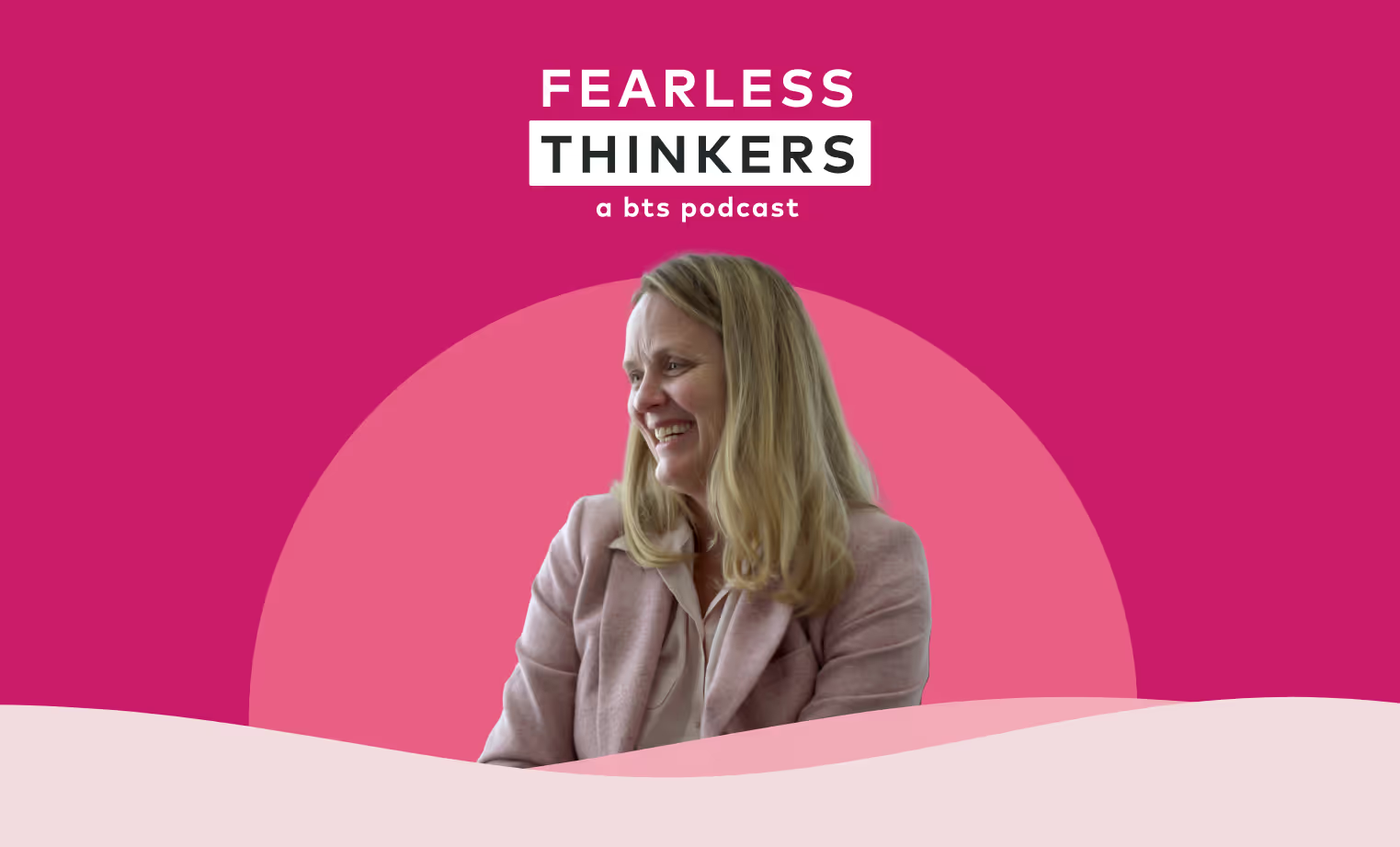
lorem ipsum

lorem ipsum

lorem ipsum

lorem ipsum

lorem ipsum

lorem ipsum

Six top CEOs from varying industries discuss the future of leadership in an AI world.
lorem ipsum
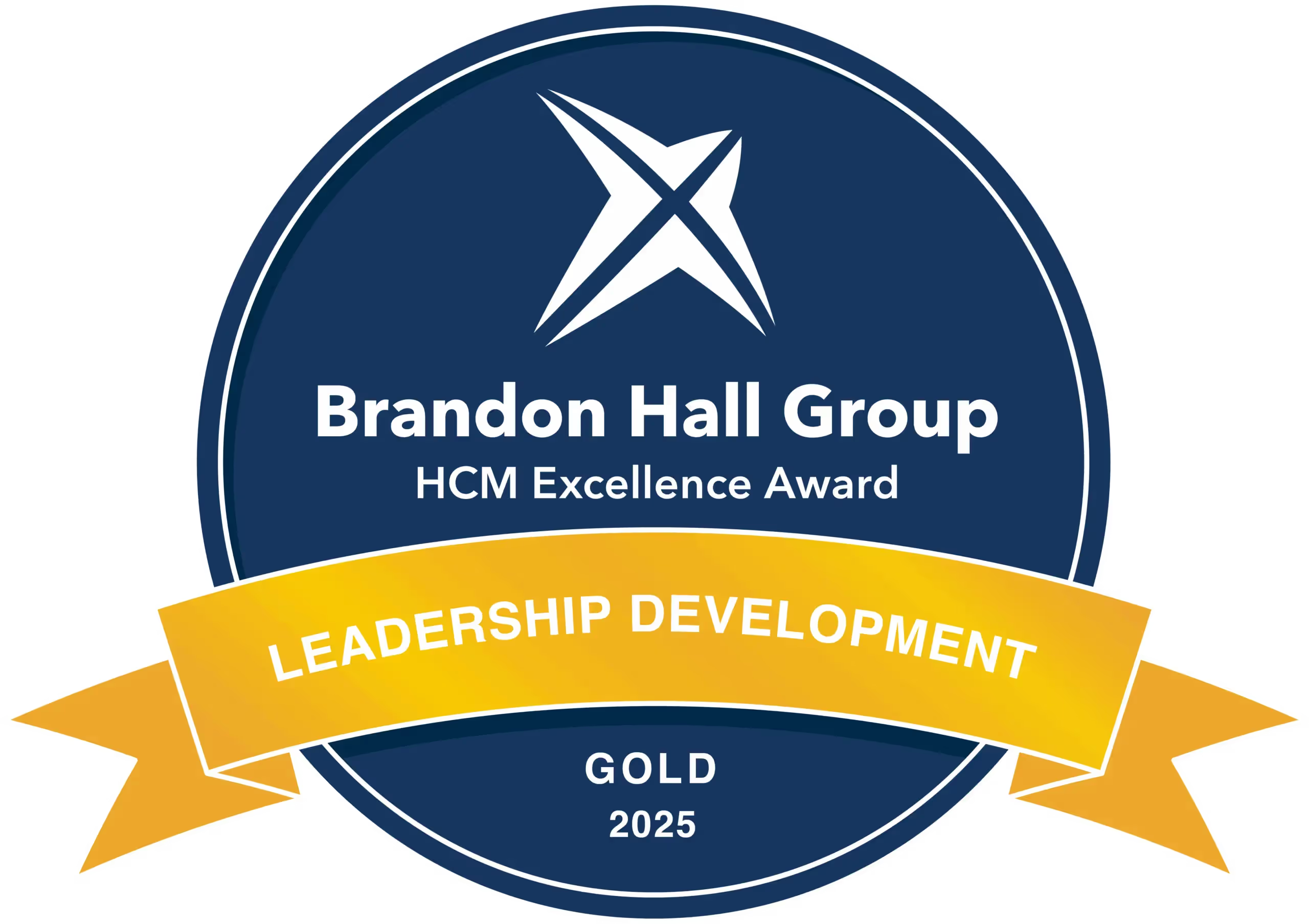
BTS has earned 59 Brandon Hall Group Excellence Awards in 2025 alongside its clients. These awards recognize some of BTS’s most innovative and effective solutions, created through close collaboration with their clients.
lorem ipsum

STOCKHOLM, SWEDEN – BTS Group AB (publ), a leading global consultancy specializing in strategy execution, change, and people development, has agreed to acquire Sounding Board, a technology-based leader in scalable, high-impact coaching solutions driving transformational leadership development.
lorem ipsum


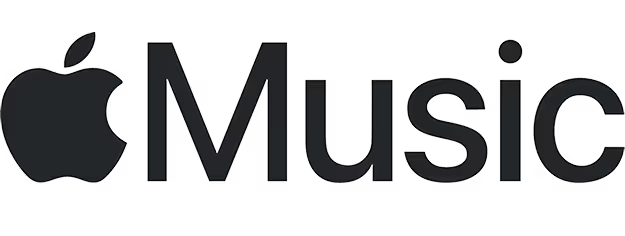

.svg)